Dry January: What are the Gut Health Benefits of Quitting Alcohol for a Month?
As the festive echoes of the holiday season fade, many of us find ourselves reflecting on our health and wellness, particularly after indulging in the merry, yet often excessive, holiday spirits. In this gut health guide, Jonathan Bailor discusses “Dry January” and why your participation can offer a host of gut health benefits.
The tradition of “Dry January” offers a timely opportunity to reset and focus on our well-being, especially in the realm of gut health, a cornerstone of overall wellness.
Imagine the month of January as a serene, rejuvenating retreat for your digestive system. The hustle and bustle of the holidays often brings a surge in alcohol consumption, which, while part of the festive spirit, can leave our guts feeling a bit overwhelmed. Alcohol, known for its impact on liver health, also plays a significant role in the balance and health of our gut flora. This connection, often overshadowed by the more immediate effects of alcohol, is crucial in understanding the profound impact of a month-long pause on drinking and alcohol abuse.
The concept of “Dry January” is not just about avoiding alcohol; it’s about embracing a period of healing and nurturing for your gut and other bodily organs. The gut, often referred to as the body’s “second brain,” plays a pivotal role in our overall health, influencing everything from mood to immunity. After the holiday season, which often includes a generous share of toasting and celebrations, giving your gut a chance to recuperate can have far-reaching benefits for your physical and emotional well-being.
Participating in “Dry January” is more than a trend; it’s a commitment to your body’s intricate systems that tirelessly work to keep you healthy. By taking this step to stop drinking, you are not only supporting your gut health but also setting a positive tone for the year ahead. It’s a gesture of gratitude to your body for its resilience and strength, especially after a season of indulgence.
As you embark on this journey of wellness, remember that the benefits of “Dry January” extend far beyond the month itself. It’s a chance to cultivate mindful habits, explore new non-alcoholic beverages, and, most importantly, listen to your body’s needs. This period of alcohol abstinence is not about restrictions; it’s about discovery, renewal, and embracing a healthier you.
The transformative power of “Dry January” on gut health is a story worth sharing. It’s an experience that can inspire friends and family to consider their own health choices and perhaps join you in this journey. Sharing your experience can spark conversations, create a sense of community, and motivate others to explore the benefits of a break from alcohol.
As you navigate through “Dry January,” let’s raise a glass (of sparkling water, perhaps) to a healthier gut, a refreshed spirit, and a vibrant start to the new year!
Understanding Dry January: A Fresh Start for Health
“Dry January” is a health-focused movement that originated in the United Kingdom in 2013, pioneered by the charity Alcohol Change UK. It encourages individuals to quit drinking alcohol for the first month of the year, promoting a period of detoxification and reflection after the indulgences of the festive season. This month-long hiatus from alcoholic beverages offers a unique opportunity to reset both physically and mentally, providing a platform for individuals to evaluate their relationship with alcohol and its impact on their health. For those who are physically dependent on alcohol, it offers them a step toward sobriety.
The significance of Dry January lies in its timing; it follows a season typically marked by higher alcohol consumption due to holiday festivities. This makes January an ideal moment for individuals to pause and prioritize their health, setting the stage for healthier habits in the year ahead. The initiative has gained global momentum, resonating with people seeking a fresh start and a proactive approach to their well-being.
Embracing Dry January can lead to numerous health benefits, such as improved sleep, better hydration, weight management, and a strengthened immune system. More importantly, it offers a chance to experience life with clarity and renewed energy, free from the influence of alcohol.
By participating in Dry January, individuals embark on a journey of self-discovery and wellness, fostering a deeper understanding of the role alcohol plays in their lives and its long-term effects on their health.
Revitalizing Gut Health: The Transformative Power of a Month Without Alcohol
Embarking on a journey of abstinence from alcohol, even for just a month, can have a transformative impact on our gut health.
The gut, a complex and vital system, plays a significant role in our overall well-being. It’s not just about digestion; the gut influences everything from immunity to mood regulation. Alcohol, while socially ingrained in our culture, can be quite taxing on this intricate system. By taking a month-long hiatus from alcoholic beverages, we offer our gut a much-needed respite, allowing it to repair, rejuvenate, and regain its balance.
This period of healing and detoxification can lead to remarkable changes, not just in our gut health but in our overall physical and mental well-being. Here are ten specific gut health benefits of pausing alcohol consumption for a month:
1. Enhanced Microbiome Diversity
Regular alcohol consumption can significantly disrupt the diversity of the gut microbiome, which is vital for various bodily functions such as digestion, producing vitamins, and protecting against pathogens. A month without alcohol gives the gut a chance to rebalance its microbial community.
This diversity is crucial for maintaining gut wall integrity, aiding digestion, and regulating the immune system. A richer microbiome also helps in breaking down food more efficiently and absorbing nutrients better, leading to improved overall health.
2. Reduced Inflammation
Alcohol can cause inflammation in the gut, leading to discomfort and potential long-term damage. It can even lead to inflammatory bowel disease or irritable bowel syndrome. By abstaining, you reduce the production of inflammatory markers and allow the gut lining to heal. This reduction in inflammation can alleviate common symptoms like bloating, gas, and abdominal pain.
Moreover, a less inflamed gut is better at absorbing nutrients and preventing harmful bacteria from entering the bloodstream, thus promoting a healthier digestive system.
3. Improved Digestion
Alcohol interferes with the digestive process by affecting stomach acid production and enzyme activity. A break from alcohol can normalize these functions, enhancing the body’s ability to digest food effectively. Improved digestion means better breakdown of food into nutrients, leading to optimal absorption and fewer digestive issues like constipation or diarrhea.
A well-functioning digestive system also ensures that the body gets all the necessary nutrients from the food you consume.
4. Strengthened Gut Barrier
Alcohol can weaken the gut’s barrier function, making the intestinal wall more permeable and allowing toxins to enter the bloodstream. A month of abstinence helps to restore this barrier’s integrity, reducing the risk of leaky gut syndrome and associated health issues.
A strong gut barrier is essential for keeping out harmful substances and maintaining a healthy immune response, which can prevent various diseases and infections.
5. Enhanced Immune Function
The gut houses a large part of the body’s immune system. Regular alcohol consumption can weaken this, making you more susceptible to infections. Abstaining from alcohol can boost your gut’s immune function, enhancing your body’s ability to fight off illnesses.
A healthy gut immune system is crucial for identifying and combating harmful pathogens while maintaining tolerance to beneficial microbes and food components.
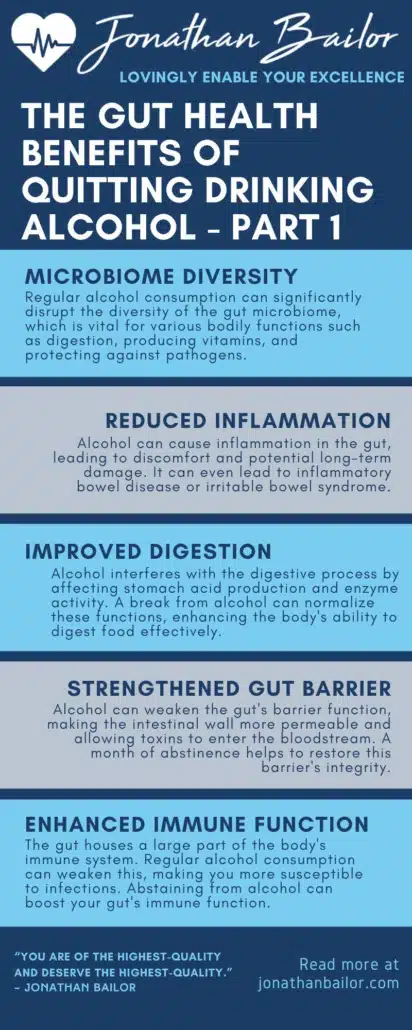
Feeling Better Is Priceless, That's Why We Don't Put A Price On It!
“It’s Like A Free and Medically Valid Version of Noom and Weight Watchers Online”
~ Dr. Doctor Matthew Oleshiak, MD
Click the 'LEARN MORE' button below for free lifetime access to the fast fix program developed by Jonathan and top Ivy League Medical Doctors
LEARN MOREP.S. It's not a free trial. It's not part of the program for free. The entire program is free, forever, for real! No credit card needed.
6. Decreased Acid Reflux
Alcohol is a known trigger for acid reflux and heartburn. It relaxes the esophageal sphincter, allowing stomach acid to flow back into the esophagus, causing discomfort and long-term damage. Refraining from alcohol can significantly reduce the frequency and severity of acid reflux episodes.
This not only provides relief from heartburn but also protects the esophagus from the harmful effects of acid, reducing the risk of esophageal disorders.
7. Improved Hydration Levels
Alcohol’s diuretic effect can lead to dehydration, negatively impacting gut health. Proper hydration is crucial for maintaining the mucosal lining of the gut and facilitating digestion. A month without alcohol can improve your overall hydration status, which is beneficial for gut motility and regular bowel movements.
Adequate hydration also aids in the elimination of waste and toxins from the body, contributing to a healthier gut environment.
8. Reduced Risk of Gastrointestinal Diseases
Chronic alcohol use is associated with a higher risk of developing various gastrointestinal diseases, including gastritis, ulcers, and certain types of cancer. A break from alcohol can lower the risk of these conditions by reducing inflammation, improving the gut barrier, and enhancing overall gut health.
This preventive measure is crucial for long-term digestive health and can significantly reduce the likelihood of developing severe gastrointestinal issues.
9. Improved Mental Health
The gut and brain are closely connected through the gut-brain axis, meaning the health of one directly affects the other. Improving gut health through alcohol abstinence can have a positive impact on mental health.
A healthier gut can produce more mood-regulating neurotransmitters like serotonin, leading to improved mood and reduced symptoms of anxiety and depression. This connection highlights the importance of gut health not just for physical well-being but also for mental and emotional health.
10. Better Sleep Quality
Alcohol consumption, especially in the evening, can disrupt sleep patterns, which in turn affects gut health. Good-quality sleep is essential for the gut’s restorative processes, including the repair of the gut lining and the rebalancing of the human gut microbiota, mostly bacteria.
Abstaining from alcohol can lead to deeper, more restful sleep, allowing the gut to heal and function optimally. Improved sleep also supports the regulation of appetite hormones, which are produced in the gut, leading to healthier eating habits and weight management.
In conclusion, taking a break from alcohol for a month can bring about significant and positive changes to your gut health. This period of abstinence is not just a temporary detox but a step towards long-lasting gut health and overall wellness.
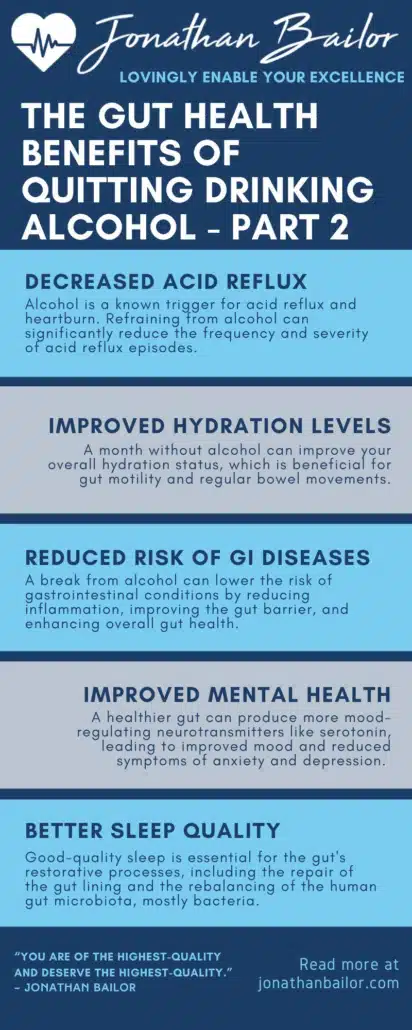
Beyond Abstinence: Nurturing Your Gut with Holistic Actions
Embarking on a path to gut health involves much more than just refraining from alcohol. While quitting alcohol is a significant step towards healing the gut, it’s only the beginning of a comprehensive journey to wellness.
The gut, a complex and vital ecosystem within our bodies, requires a multifaceted approach to truly thrive. It’s not just about what we remove from our diets and lifestyles but also about what we introduce and embrace. To fully support and rejuvenate our gut health, we need to engage in a variety of nurturing practices that extend beyond abstaining from alcohol. These practices encompass not only dietary changes but also lifestyle adjustments that honor the intricate relationship between our gut and our daily habits.
Here are five essential actions that can significantly aid in healing and maintaining a healthy gut in the human body, ensuring it operates optimally as the cornerstone of our overall health and well-being.
1. Incorporate Probiotics and Prebiotics
To nurture a healthy gut, integrating probiotics and prebiotics into your diet is essential. Probiotics, found in fermented foods like yogurt, kefir, and sauerkraut, introduce beneficial bacteria to your gut. Prebiotics, on the other hand, serve as food for these bacteria, fostering their growth and activity. Prebiotic foods include garlic, onions, bananas, and asparagus.
This combination helps maintain a balanced gut microbiome, crucial for digestion, immunity, and overall health. Remember, a diverse gut microbiome is akin to a flourishing garden; it needs the right nutrients and care to thrive.
2. Stay Hydrated
Proper hydration is paramount for gut health. Water is essential for maintaining the mucosal lining of the intestines and for the digestion and absorption of nutrients. Aim to drink at least eight glasses of water daily to ensure your digestive system functions optimally.
This simple yet effective habit aids in transporting nutrients, eliminating waste, and keeping the intestinal lining healthy. Think of water as the river of life flowing through your digestive system, carrying essential elements and flushing out the unwanted.
3. Manage Stress Effectively
Chronic stress can severely impact your gut health, leading to issues like indigestion and irritable bowel syndrome.
Engaging in stress-reducing activities such as yoga, meditation, or even simple breathing exercises can significantly benefit your gut. These practices help calm the nervous system, reduce gut inflammation, and improve overall digestive functioning.
Just as a calm sea allows for smoother sailing, a relaxed mind promotes a healthier gut.
4. Eat Slowly and Mindfully
The way you eat is just as important as what you eat. Chewing your food thoroughly and eating in a relaxed environment can greatly improve digestion. It allows for better breakdown of food and efficient nutrient absorption, reducing the burden on your digestive system.
Mindful eating also ensures you are aware of your body’s hunger and fullness cues, preventing overeating and digestive discomfort. Consider each meal an opportunity to nourish and respect your body, savoring every bite for optimal gut health.
5. Limit Artificial Sweeteners and Processed Foods
Artificial sweeteners and processed foods can disrupt the gut microbiome and irritate the gut lining. These substances often contain chemicals and additives that can negatively impact the delicate balance of gut bacteria.
Opt for whole, natural foods as much as possible to support gut healing. Fresh fruits, vegetables, lean proteins, and healthy fats are the building blocks of a gut-friendly diet. Just like a machine functions best with the right fuel, your gut thrives on wholesome, natural foods.
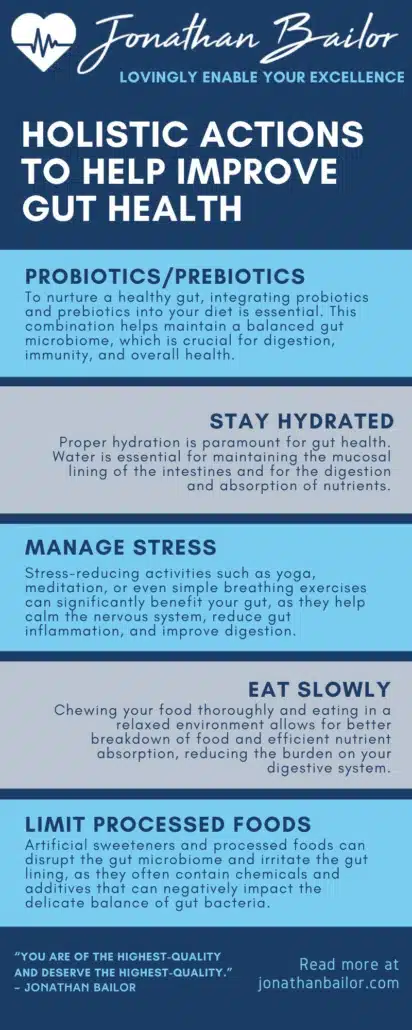
FAQs on Nurturing Gut Health: Understanding the Core of Our Well-being
What is the Gut Microbiome and Why is it Important?
The human gut microbiome is a complex community of microorganisms living in our digestive tract. Think of it as a bustling city within our gut, where each microbe or bacteria present plays a specific role in our body’s functioning. Most of gut bacteria are located in the large intestine, though some also live in the small intestine.
These microbes help in digesting food, producing vitamins, regulating our immune system, and even impacting our mood and mental health. Maintaining a balanced and diverse gut microbiome is crucial for digestion, preventing chronic disease, and overall health.
When the gut microbiota is unbalanced, called gut dysbiosis, anaerobic bacteria can become opportunistic pathogens, leading to severe infections. Disruptions in this microbiome can lead to a range of health issues, making its care a key aspect of our well-being.
How Can Diet Affect Human Gut Health?
Our diet has a direct impact on our gut health. Foods rich in fiber, like vegetables, fruits, and legumes, feed the beneficial bacteria in our gut. On the other hand, excessive consumption of processed foods, sugar, and unhealthy fats can promote harmful bacteria, leading to an imbalance known as dysbiosis.
This imbalance can cause digestive issues, inflammation, and even contribute to chronic diseases. Incorporating a diverse range of nutrient-rich foods can foster a healthy gut microbiome and enhance our overall health.
What Are the Signs of an Unhealthy Gut?
An unhealthy gut can manifest in various ways, some of which might not seem directly related to digestive health.
Common signs include persistent digestive discomfort, such as bloating, gas, constipation, or diarrhea. Beyond digestion, an unhealthy gut can lead to fatigue, unexplained weight changes, skin irritations like eczema, and even mood disorders like depression and anxiety. If not reversed, an unhealthy gut can lead to cardiovascular disease, insulin resistance, diabetes, high blood pressure, bowel disorders, such as ulcerative colitis, and other conditions.
These symptoms indicate a need to reassess our diet and lifestyle choices to support gut health.
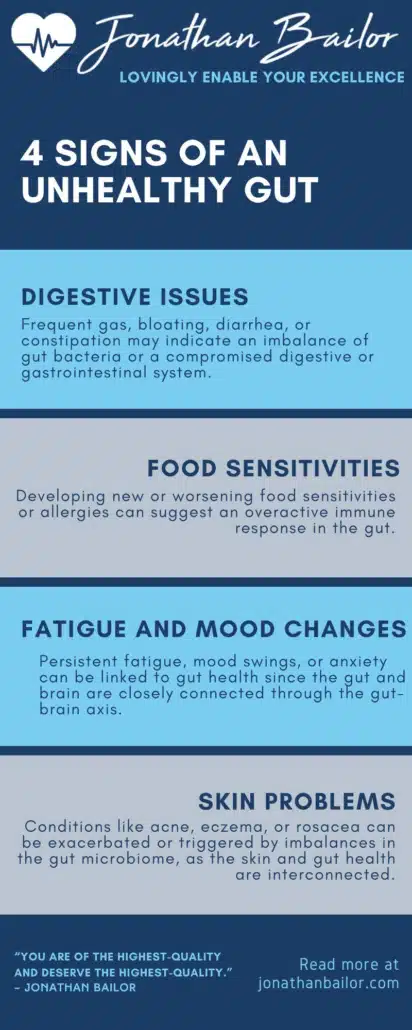
Can Probiotics and Prebiotics Improve Gut Health?
Yes, probiotics and prebiotics play a crucial role in maintaining gut health. Probiotics are beneficial bacteria that can be found in fermented foods like yogurt, kefir, and kimchi. They help restore and maintain a healthy balance of gut flora. Prebiotics, found in foods like garlic, onions, and bananas, act as food for these beneficial bacteria.
Together, they work synergistically to enhance gut health, improve digestion, and boost the immune system.
Is Stress Linked to Gut Health?
Absolutely, stress is intricately linked to gut health due to the gut-brain axis, a two-way communication system between the gut and the brain. Chronic stress can disrupt this communication, leading to changes in gut motility, an increase in gut inflammation, and susceptibility to infection.
Managing stress through techniques like meditation, exercise, and adequate sleep can help maintain a healthy gut-brain connection and improve overall gut health. Remember, a calm mind often leads to a healthier gut.
Understanding and nurturing our gut health is a journey that goes beyond diet and encompasses our entire lifestyle. By paying attention to these aspects, we can ensure that our gut, and thereby our overall health, is in optimal condition.
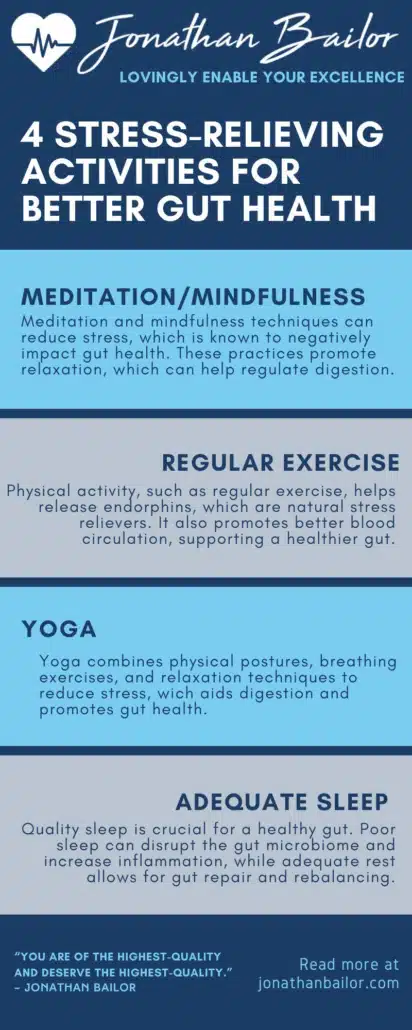
Cultivating Continuous Wellness: Beyond Dry January
As we reflect on the insights gained about nurturing our gut, it becomes evident that caring for this vital organ extends well beyond the commitment of Dry January. Embracing gut health is a continuous journey, offering profound benefits for a healthy body and our overall well-being.
I encourage you to share the wisdom of gut wellness with your friends and family. Spread this valuable knowledge through social media or a personal email, inspiring those around you to join in this journey of health.
Together, let’s celebrate the steps towards a healthier gut, not just for a month but as a lifelong commitment to human health and wellness.
Feeling Better Is Priceless, That's Why We Don't Put A Price On It!
“It’s Like A Free and Medically Valid Version of Noom and Weight Watchers Online”
~ Dr. Doctor Matthew Oleshiak, MD
Click the 'LEARN MORE' button below for free lifetime access to the fast fix program developed by Jonathan and top Ivy League Medical Doctors
LEARN MOREP.S. It's not a free trial. It's not part of the program for free. The entire program is free, forever, for real! No credit card needed.




